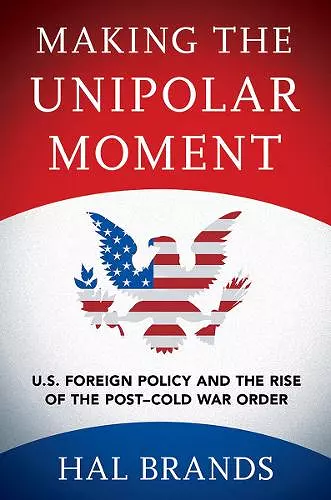Making the Unipolar Moment
U.S. Foreign Policy and the Rise of the Post-Cold War Order
Format:Hardback
Publisher:Cornell University Press
Published:12th May '16
Currently unavailable, and unfortunately no date known when it will be back
This hardback is available in another edition too:
- Paperback£23.99(9781501747069)

In the late 1970s, the United States often seemed to be a superpower in decline. Battered by crises and setbacks around the globe, its post–World War II international leadership appeared to be draining steadily away. Yet just over a decade later, by the early 1990s, America’s global primacy had been reasserted in dramatic fashion. The Cold War had ended with Washington and its allies triumphant; democracy and free markets were spreading like never before. The United States was now enjoying its "unipolar moment"—an era in which Washington faced no near-term rivals for global power and influence, and one in which the defining feature of international politics was American dominance. How did this remarkable turnaround occur, and what role did U.S. foreign policy play in causing it? In this important book, Hal Brands uses recently declassified archival materials to tell the story of American resurgence.
Brands weaves together the key threads of global change and U.S. policy from the late 1970s through the early 1990s, examining the Cold War struggle with Moscow, the rise of a more integrated and globalized world economy, the rapid advance of human rights and democracy, and the emergence of new global challenges like Islamic extremism and international terrorism. Brands reveals how deep structural changes in the international system interacted with strategies pursued by Jimmy Carter, Ronald Reagan, and George H. W. Bush to usher in an era of reinvigorated and in many ways unprecedented American primacy. Making the Unipolar Moment provides an indispensable account of how the post–Cold War order that we still inhabit came to be.
Hal Brands has catapulted into the foremost ranks of a new generation of US strategic thinkers.
* Foreign Affairs *In attempting to explain the rise of US power from the late 1970s to early 1990s, Brands focuses on the balance between structural changes in global politics and strategic decisions by US leaders. In the debate between structure and agency, the book reaches the conclusion that they are both integral in explaining complex international events. The book is engaging and well researched. It is a valuable contribution to the literature on this important era and relevant to current debates about America's role in the world. Summing Up: Recommended. Upper-division undergraduates through faculty.
* Choice *There are lot of books about the Cold War, and a lot of books about 'the state of the mess we're in.' There are books about globalization, about failed states, and about America's relations with the various parts of the world. What's missing, however, is a book about how we got here: how the United States went from a superpower on the rocks in the 1970s to a supreme power dominating a unipolar world in the 1990s. That's why I've been fascinated with Hal Brands' new book. If you want to see how far we came from the edge of ruin—and how far we're falling from the achievements of the 1990s—this carefully researched book is essential reading.
* The Federalist’s Notable Books of 2016 *Making the Unipolar Moment is an impressive work of historical research, analysis, and interpretation. It is also an indispensable resource that points towards areas of new inquiry for scholars who seek to understand the central debates about structure, strategy, and power in U.S. foreign relations.
* Diplomatic History *In this beautifully crafted, cogent, and thoroughly researched book, Hal Brands offers a compelling explanation for this stunning reversal of U.S. fortunes.... His astute observations about the potentially decisive relationship between global trends and competent strategizing in the White House will no doubt give many readers pause for reflection and concern at a time when the worldwide currents are shifting toward authoritarianism, economic nationalism, and jingoism.
* Journal of American History *Hal Brands has written his magnum opus.... Brands's writing is inviting, unadorned, and conversational. Each paragraph and sometimes each sentence invites thoughtful reflection.
* Public Administration Review *Brands writes smoothly and accessibly, with a gift for summing up a major point in a well-turned phrase. These virtues, along with its broad focus, will make the book useful for teaching advanced undergraduates and master's degree students.
* Political Science Quarterly *Hal Brands has written a book which is indispensable reading for any scholar of the Cold War.... The book is beautifully written, allowing the reader to canter through pages, but return to ponder upon a phrase that either stimulates or provokes the reader to think more deeply.
* Reviews in American History *Hal Brands's new book... exceeds high expectations with its depth, nuance, and clarity that are further enhanced by a stimulating and readable style.... An important book that will no doubt serve to influence contemporary debates as much as it provides a revisionist account of America's rise to power in the 1990s.
* International Affairs *Brands constructs solid arguments that address the symbiotic interaction between historical forces and conscious policy decisions.... What especially makes this book timely are the quandaries confronting policymakers in Washington because of the resurgence of Putin's Russia as an aspiring global power in competition with this country, the challenge of China's aspirations in Asia, and the growing appeal of radical Islam. This is an important, informative, and stimulating book.
* Air Power Histo- Winner of Foreign Affairs "Best Book" 2017 (United States)
ISBN: 9781501702723
Dimensions: unknown
Weight: 907g
480 pages